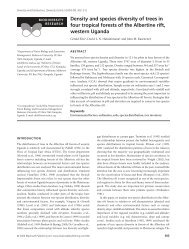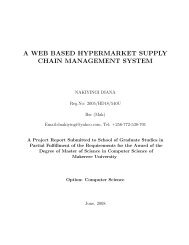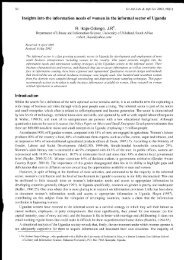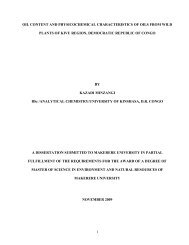THE UNIVERSITY OF LEIPZIG
THE UNIVERSITY OF LEIPZIG
THE UNIVERSITY OF LEIPZIG
You also want an ePaper? Increase the reach of your titles
YUMPU automatically turns print PDFs into web optimized ePapers that Google loves.
can have remarkable consequences at a later date, regardless of whether they were adopted<br />
purposefully or unthinkingly and that some policy choices may prove almost irreversible.<br />
Overall, we ought to note that there are a number of important theoretical and analytical<br />
problems in the use of the historical institutional approach. The very factors that make the<br />
approach so appealing at the onset such as a description of reality tend to diminish its ability<br />
to function as an explanation of those same phenomena. 239 That is to say, the notion that<br />
institutions persist along well-worn paths when they make policy and when they manage their<br />
internal affairs, is a common observation about organizations, whether public or private. That<br />
observation borders on banality, especially when considered in the context of constructing<br />
institutional theory. 240 Furthermore, the ability to predict persistence does not help in<br />
understanding institutional change. If, as in the historical institutionalist account, change tends<br />
to be defined in primarily terms of major shifts away from the status quo, then somewhat<br />
paradoxically we are left with little possibility of institutional explanations for change.<br />
Sociological Institutionalism<br />
Sociological institutionalism buds out of sociology, the sub-field of organizational theory. It<br />
attempts to look at cultures and the study of organization. 241 According to Hall and Taylor,<br />
sociological institutionalism was developed by the Stanford sociologists Meyer, Rowan,<br />
Scott, DiMaggio and Powell from the late 1970s. 242 The intellectual root of this school of<br />
thought illustrates the distinction between those parts of the social world said to reflect a<br />
formal means-ends to rationality and those parts said to reflect culture. Sociological<br />
institutionalists build on this to argue that, the reason why many of the institutional forms and<br />
procedures used by modern organisations have been adopted, is not necessarily that they are<br />
most efficient for the task at hand. Instead they argue that many of these forms and procedures<br />
should be seen as culturally-specific practices. 243 This is opposed to views that see certain<br />
institutional forms as inherently and transcendently rational. Examples are ‘weberian’<br />
portraits of bureaucracy.<br />
Hall and Taylor argue that one distinctive feature of sociological institutionalism relates to the<br />
relationship between institutions and individual action. 244 We have seen that this branch of<br />
new institutionalism typically has a ‘cultural’ approach to this relationship. This implies that<br />
239<br />
Weir, M. 1992. Ideas and the Politics of Bounded Innovation. In Structuring Politics: Historical<br />
Institutionalism in Comparative Perspective, edited by S. Steinmo, K. Thelen and F. Longstreth.<br />
Cambridge: Cambridge University Press.<br />
240<br />
Hedstrom, P., and R. Swedborg. 1998. “Social Mechanisms: An Introductory Essay.” In Social<br />
Mechanisms:An Analytic Approach to Social Theory, edited by P. Hedstrom and R. Swedborg.<br />
Cambridge:Cambridge University.<br />
241<br />
Selznick, P. 1949. TVA and the Grassroots: Study in Sociology of formal Organization. Barkley: University<br />
of California Press.<br />
242<br />
Hall, P and R. Taylor. 1996. Political Science and the Three New Institutionalisms. Political Studies 44: 936-<br />
958.<br />
243<br />
March, J. 1999. The pursuit of organizational intelligence. Malden MA: Blackwell.<br />
244<br />
Karen, L. R. 1997. Theoretical Decay and Theoretical Development: The Resurgence of Institutional<br />
Analysis,’ World Politics, 50:34-61.<br />
49






